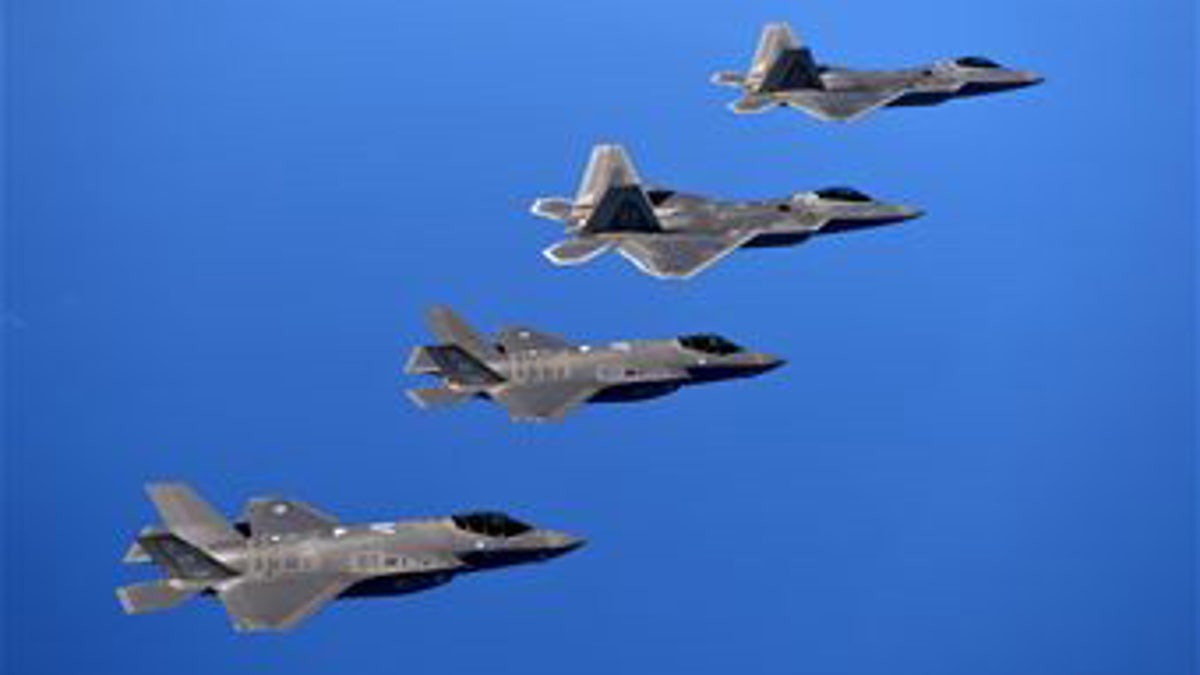
(U.S. Air Force photo/Master Sgt. Shane A. Cuomo)
The Air Force got a glimpse of its high-tech future recently as the costly and controversial new F-22 Raptor aircraft undertook its first training mission with next-generation F-35A Lightning strike fighters.
Four F-22s from Joint Base Langley-Eustis in Virginia joined F-35s from the 33rd Fighter Wing for integration training at Eglin Air Force Base in Florida earlier this month.
The training allowed the Air Force to gain “operational familiarization and capture lessons learned to improve future exercises,” according a statement released earlier this week.
Rebecca Grant, president of Washington D.C.-based defense research firm IRIS Independent Research, told FoxNews.com the training mission marks a milestone in the evolution of U.S. air power.
“This is game on - the F-35 and the F-22 are the only peers for each other,” she said. “It’s good to see this happening, finally - it’s the dawn of a new age in air combat.”
In particular, Grant lauded the planes’ “immense” avionics and stealth capabilities. “It’s the most sophisticated duo ever,” she added.
Military personnel described the training as extremely valuable.
"When the F-22 and F-35 come together, it brings out the strength of both airplanes," said Lt. Col. Matt Renbarger, F-35 pilot and commander of the 58th Fighter Squadron, in the statement. "The F-22 was built to be an air-to-air superiority fighter and the F-35 was built to be a strike fighter. These airplanes complement each other and we're trying to learn how to take that from a design perspective into a tactical arena and be the most effective combat team we can be working with the F-22s."
"The missions started with basic air-to-air and surface attacks," added Maj. Steven Frodsham, F-22 pilot and member of the 149th Fighter Squadron, Virginia Air National Guard. "As the training progressed, the missions developed into more advanced escort and defensive counter air fifth-generation integration missions."
In its statement, the Air Force noted that the F-35 is moving closer to its “initial operational capability.”
The F-35 strike fighters will replace the venerable A-10 Thunderbolt II, affectionately known as the "Warthog.” A recent virtual dogfight between Congress and Air Force officials over the A-10 Thunderbolt’s retirement, however, has raised concerns of F-35 program delays.
The Marine Corps is looking to introduce the F-35B as early as July 1, 2015. The Air Force is planning to introduce the F-35A’s initial operating capability on Aug. 1, 2016.
Grant told FoxNews.com that, as the F-35 proves its capabilities, it will quickly overshadow the decades-old A-10. The expert is also confident that deadlines for introducing the strike fighter will be met.
“The need for the A-10 will look a bit different when we have several squadrons of F-35s,” she said. “Missions like this integrated training mission create new tactics that pilots have never thought about before – to have F-22 with F-35 will expand the horizons for both.”
The F-22 made a high-profile combat debut during bombing runs over Syria in September, giving defense experts a first look at its lethal firepower.
Developed by Lockheed Martin, the F-22 has been touted as the world’s premier fighter aircraft and a key weapon in the U.S. military’s high-tech arsenal. However, with a price tag of $67 billion and beset by problems, the F-22 program has come under intense scrutiny. Only 188 of the planes have been built.
Follow James Rogers on Twitter @jamesjrogers
